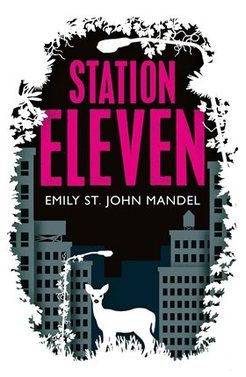
I don’t know if it’s surviving trauma that evokes such apocalyptic philosophising or whether it’s integral to the human condition. There’s certainly an attraction in the theme for writers of fiction; I’ve just counted seven novels on my bookshelves that speculate on the impact on human society of devastating global pandemics or massive climate change. You might have even more, so how do I persuade you that Station Eleven is the one you really must read?
I received my proof copy several months prior to publication and, although I was interested in the premise, I wasn’t in a great hurry to read it, perhaps put off by the hype. It’s described as perfect for fans of Hugh Howey, who I’ve never read, and Margaret Atwood, who I have, a lot. I can detect the similarities to The Blind Assassin and Oryx and Crake, both books I loved, but I’m not a fan of fanfiction. In a fair world, where writing was judged on its merits, Emily St John Mandel wouldn’t need to be compared with the literary greats. She is an excellent writer in her own rights. More fool me for not picking it up sooner.
A novel of such wide scope could seem fragmented, but one of its greatest pleasures lies in discovering the interconnections. The novel’s title comes from a comic book depicting another post-apocalyptic world which provided solace for both its creator in the “before” period and a young actress in the “after”. The Shakespeare that opens the novel gets a repeat performance from the band of actors travelling through forests and logjams of rusting cars to entertain the scattered survivors. Furthermore, each of the main characters has some important link with Arthur Leander.
Connections are also essential to the characters’ post-epidemic survival as the company of actors and musicians bring art to the remote settlements that have sprung up around defunct petrol stations and airports, and as they support and protect each other from the dangers of the open road and the machinations of the mysterious “prophet”. Earlier, with communication systems breaking down, the infected struggled to connect with loved ones before the world as they knew it came to an end. The attempted mass exodus from the cities made me think, in its futility, of our vain attempts to escape the unwanted parts of ourselves. An adventure story, science fiction, call it what you will, Station Eleven is a moving and gripping story of the human condition. But if that all seems too much for you, there’s a gentler take on our attempts to recover lost connections in Lucky Us, which I reviewed last week.
Station Eleven is published today. Thanks to Picador books for my advance copy.
Which novels depicting a future dystopia have you enjoyed? How do you think you’d survive such a scenario yourself?





















 RSS Feed
RSS Feed





















